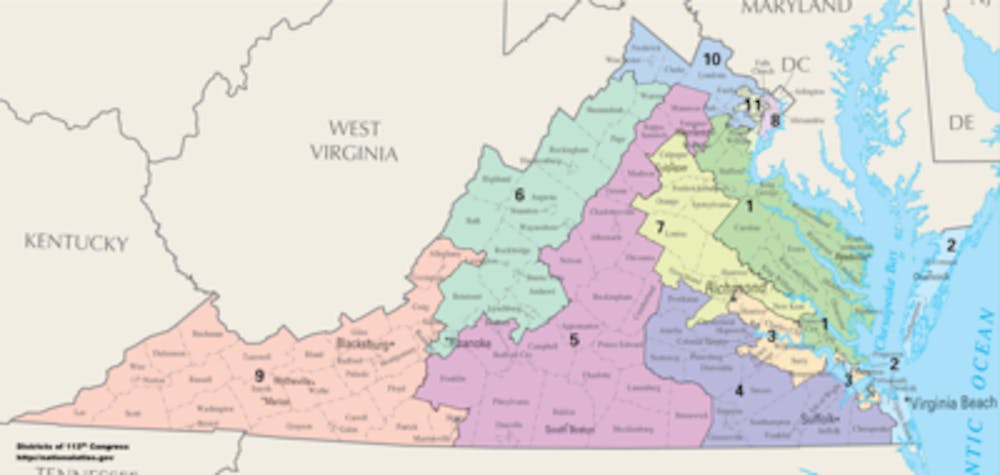A panel of federal judges Tuesday ruled Virginia’s congressional district map unconstitutional because of racial gerrymandering in the 3rd District.
The ruling held that the unusual lines of the Democratic-controlled 3rd District were drawn intentionally to concentrate African-Americans in the district — a violation of the 14th Amendment.
Center for Politics spokesperson Geoffrey Skelley said the ruling would not have any immediate effects.
“This ruling will only affect the map starting with the 2016 election,” Skelley said in an email. “Presumably, the General Assembly will meet and decide on new lines, perhaps in the next legislative session in January 2015.”
The decision, handed down in the U.S. District Court for the Eastern District of Virginia, requires the General Assembly to produce a new map by April 2015.
The 3rd District is Virginia’s only district with a majority of African-American residents, who account for 56.3 percent of the district's voting-age population. The 3rd District's borders reach across southeastern Virginia and include parts of Richmond, Newport News and Norfolk.
Democrat Robert “Bobby” Scott has held the 3rd District seat since 1993 as one of only three Congressional Democrats from Virginia. Republicans currently hold seven of Virginia’s 11 districts. The 7th District seat is currently vacant, but was held by Republican Eric Cantor until he resigned in August.
Virginia’s controversial congressional district map has garnered increased attention in the last several years.
Gregory Lucyk, a member of OneVirginia2021, a Charlottesville-based organization founded in early 2013 which advocates non-partisan redistricting, said in a press release that redistricting should be done “by an impartial, independent commission, using non-partisan criteria, that invites public participation and is fully transparent."
Last October, 3rd District residents Dawn Curry Page, Gloria Personhuballah and James Farkas filed a complaint against the Virginia State Board of Elections, claiming racial gerrymandering motivated the drawing of district lines in the 2011 redistricting cycle in violation of their equal rights.
Skelley said redistricting could shake things up between party lines.
“Given that the current map protects many more GOP incumbents than Democratic incumbents and the fact that a new map will almost surely further spread out strongly Democratic black voters, Democrats probably stand to gain at least to some degree with new lines,” Skelley said.
Gov. Terry McAuliffe released a statement in support of the ruling, calling it an “opportunity to emerge with a map that reflects the best interests of Virginia families, not the political interests of the people drawing the lines.”
Skelley said Virginians should expect a compromise to emerge from the eventual redrawn district map.
“With divided control of government in Richmond — Republicans control both chambers in the General Assembly and Democrats the governorship — neither side is likely to get exactly what they want with a new Congressional map,” Skelley said. “So some sort of compromise map is probably to be expected. If no compromise occurs for some reason, the courts would end up drawing the lines."







